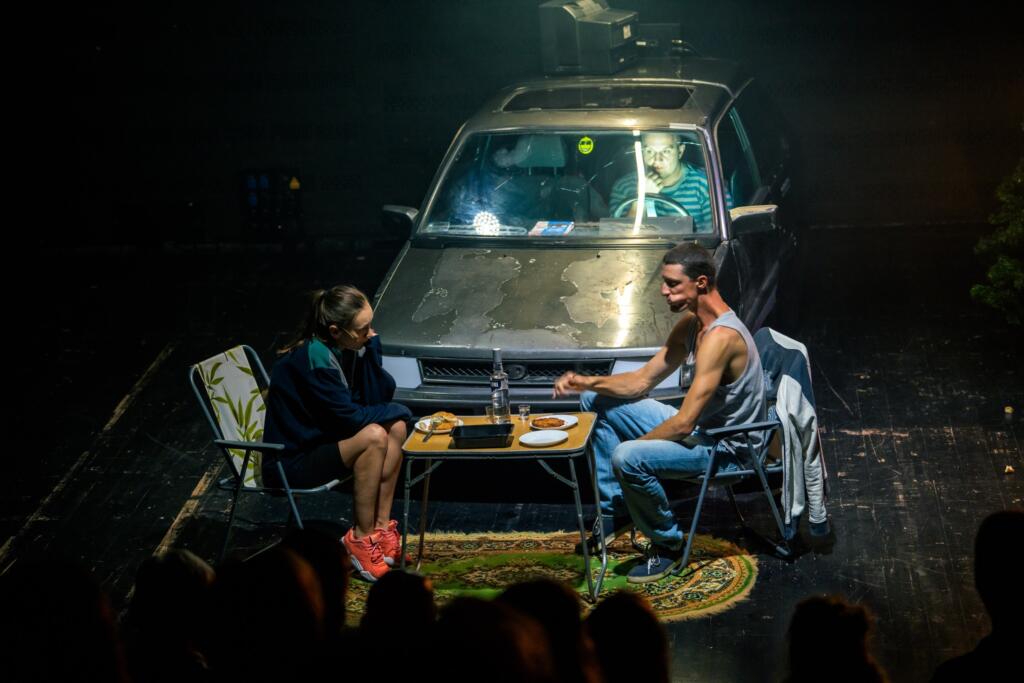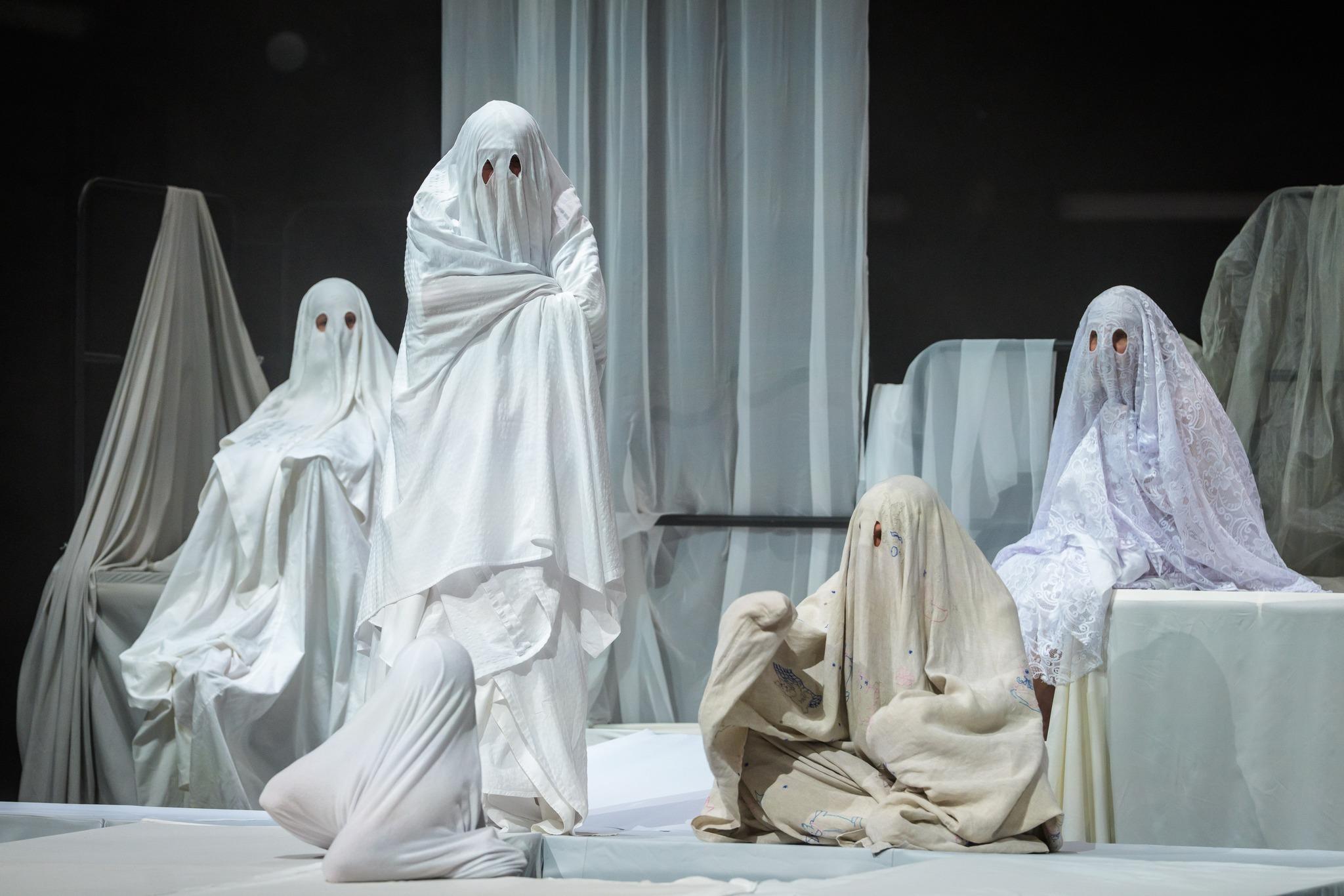The International Shakespeare Festival in Gdańsk is not the festival of masterpieces and it never has been its aim. However, if you are looking for interesting, innovative and updated voices in reading Shakespeare’s plays you should definitely follow the upcoming edition and visit Gdańsk in Poland. I am sure you will find something worth sharing with your audience.
The Festival is divided into three sections – Golden Yorick, New Yorick competition (selected performances created by young artists), OFFShakespeare (winners of the open call and presented during the festival) and international performances, not included in the competitions. Most performances were sold out and the meetings overcrowded – from a walking tour inspired by plants mentioned in Shakespeare’s plays to a debate on Psychology According to Shakespeare, Zimbardo and Johnson’s latest book. Even though the festival is more a presentation of performances rather than a strong artistic idea itself – it definitely invited the public to experience a variety of theatrical languages and statements, this time mingling together prevalent, contradictory subjects: violence and therapy.
War Isn’t Murder
As Achile Mbembe writes in Brutalism – today’s brutalism is part of our individual private and public reality and we moved its boundaries so far, that we hardly see violence where it is. The world we live in normalizes scandal, immorality, unloyalty, fascism, racism and exclusion – it forces theatre to rethink artistic tools and language of communication to establish a new level of exchanging thoughts between stage and audience. It seems impossible to maintain the distant perspective and comment on the disintegrated world around us, pretending it is ‘their’, not ‘our’ fault. In the world filled with strong words and actions facts no longer matter; opinions do. Maybe that’s the reason why the most successful performances in this year’s edition avoided depicting divisions, did not speak for any side of a conflict; after watching dozen or so performances I had a feeling contemporary artists want to look deep into the legacy of Shakespeare’s characters fate and lines to find the warnings we have missed, so we ended up where we are.
Even though the political context – both international and Polish – is very obvious in Shakespeare’s plays, some artists avoided simple associations with contemporary leaders ruling worldwide politics; We are all Richards. Exhumation 2000 by Aleksandra Bielewicz derives from a very interesting idea to read the play through the exhumation and reburial of Richard III of England from 2015. Mixing drama theatre, choreography, and documents, Bielewicz re-reads the text, lets the king re-tell his story and perform it within family relations inspired by Hellinger’s system using it as a theatrical tool; Bielewicz lets Richard (excellent Tomasz Nosiński) to present himself from a more ‘human’ point of view, regaining his dignity.
Jadwiga Klata staging Corolianus instructed the main character to sing War isn’t murder by Jesse Welles with the phrase ‘War isn′t murder, ask Netanyahu/He’s got a song for that and a bomb for you/War isn’t murder, it′s an old desert faith/It′s a nation-state sanctioned, righteous hate’. Of course, her performance is not about the Israeli Prime Minister – Klata draws a figure of a powerful (wo)man who is aware that (s)he relies on folks’ votes, and folks have a feeling they decide about the fate – both sides try to trick the other in the name of law and justice. Indeed, Klata pictures attitudes more than people – four actors (Bożena Adamek, Julia Latosińska, Tomasz Wysocki and Alina Szczegielniak) speak in a stable tone and tempo, trapped in a metal cage picturing politics as a perpetuum mobile, not the excess.

The Taming of the Shrew. 29th Shakespeare Festival 2025, Gdańsk, Poland. Photo Credits: Dawid Linkowski
Julius Caesar is a monumental and perplexing performance by Błażej Biegasiewicz; it starts outside the venue with simultaneous monologues by the characters and the audience approaching each of them to catch a word. When the show starts inside, we follow a set of chaotic scenes depicting social chaos; Caesar (Paweł Wolak) is not a strong leader; he repeats the lines, his monologues don’t make sense, and his enemies are interested in taking over his place and manipulating the crowd. Some scenes are performed behind the wall, and streamed by a live camera following them. Later on, actors invite spectators to join them on stage and listen to expressive political monologues of the opponents. Even though all the elements – mesmerizing music, choreography, impressive costumes and set design – create a very strong environment for Shakespeare’s ideas, the director failed to compile them in one and drowned in obvious, bombastic declarations.
The presentation of the political plays posed an interesting question on how to create a convincing and moving picture of the contemporary, radical authority? Maybe it is too late to explain the mechanisms of power since it is necessary (and enough) to refresh the news browser to update our reality? Maybe there is nothing more than Richard’s line ‘It has always been about admiration.’
Awarded performance The Taming of the Shrew by Ewa Platt is an impressive and painful piece reclaiming the floor for the victims of domestic abuse and toxic relationships. Platt tells the story of Kate and Petrucchio (both brilliant Joanna Osyda and Konrad Wosik) with no humour, distance and comedic style – her performance is humble but with a really powerful message. Their ‘relationship’ happens between the lines, in a few seconds too long eye contact or silence, at the edge of decay. Masculine violence is invisible here and gets easily gaslighted. One hour performance takes place in a small stage with the car in the middle – the symbol of a trap. Kate and Petrucchio talk inside it about their ‘love’, she uses it as a bed to sleep on, but also it becomes a metaphor of his power over her when he chooses to mend it instead of listening and looking at her. The abuse and violence are being performed in front of the third character – the tailor and Petrucchio’s friend (Maciej Czerklański). He doesn’t defend her, but tries to diminish what is going on, in order to avoid the conflict. His presence in each scene is also the end of Kate – no one can save her, no one will tell her: you’re not crazy, run away. Platt works with the actors on delicate gestures, voice tones, building an unbearable atmosphere of violence which is profoundly felt but impossible to name precisely. At the end Kate convinces the audience that she is the ideal wife since she understands her husband and is always ready to find his virtues. Against the facts. And she is not kidding, the ending is not ironic at all.
The winner of Golden Yorick Award The Winter’s Tale by Pamela Leończyk is a really surprising idea to not only follow Shakespeare’s characters and plot but to create a space to investigate how they take responsibility for their actions. The first part of the show presents marriage therapy in which the characters share their experience, thoughts and feelings about sexual needs, betrayals, love and loyalty; not always serious, especially when Leontes (Grzegorz Atman) sees the session as a chance to complain about his fate and dominate Hermiona (Karolina Adamczyk), his wife. Precision and accuracy in reading the text create an impression as if Shakespeare’s story was created for such an interpretation – the dialogues perfectly mirror relationships between husband, wife, and two therapists. But the significant plot twist comes in the second part, in which Leończyk and dramaturge Daria Sobik, together with an absolutely hypnotizing cast, let Perdita (Anna Ilczuk), abandoned daughter of Hermiona and Leontes, speak out. Mixing original text with contemporary lines she gets her chance to draw a very moving picture of damaged father-daughter relationship. Perdita joins their therapy but only to remind them of his absence, ignoring her, forgetting about important dates, not coming to school, not worrying in the time of her adolescence – things that grown ups work through in therapy to feel free and live their own life. The show has an ironic sum up – all characters sing a song about the happy ending and reconciliation, but Perdita – although she forgave her father – does not continue the relationship with him. This is a very precious monologue in which the woman tells the audience that ‘letting go’ is not necessarily ‘forgetting’ and the scars on your heart would never disappear, but they may stop bothering you. And when the show ends with the warning that ‘we will all have to pay for our deeds’, they pay… the therapist for another family session.
The Winter’s Tale. 29th Shakespeare Festival 2025, Gdańsk, Poland. Photo credits: Dawid Linkowski.
Therapy as an artistic tool is also used in The Ghost Enters by Weronika Szczawińska. The starting point for creating the script was a scene in which Hamlet meets the ghost of his father. Of course, the ghost reveals the truth of his death and obliges his son to take revenge. Szczawińska and the cast widen the frame of the ‘meeting your father situation’ and they let the ghost of the father speak out. Actors disguised with bedsheets with the eye holes evoke the ghosts to confront them or let them speak. Later scenes refer to toxic, silent fathers, or those helpless with bringing up children, fathers lecturing and blaming everyone for their failures, but also – theatrical fathers – authorities we used to look up to, admire or had been compared with. The show is far from a diagnosis, rather opening a (humorous) space to invite our own father ghosts.
I would also like to mention one exceptional performance, Midsummer Night’s Dream – far from interpretations imposed on Shakespeare’s play. Michał Zadara is a well-known director famous for deriving his performances from close-reading, sometimes staging text with no changes (his longest piece was 13 hours Forefathers’ Eve). His latest show is a very clever and light comedy created with a sense of humour and brilliant acting. Watching Zadara’s performance is an invitation to listen to the text and follow both dynamic, subtle and smart theatrical ideas. Actors perform with almost tangible pleasure and, together with Zadara, introduce the audience to the world of theatre and do not seek for any interpretation – what you take depends on you.
‘Thus, by choosing the motto “Words, words, words,” we are referring to the overload of information, emphasizing how easy it is to get lost in a sea of words and how important it is to find those that truly matter. In the age of social media and digital communication, words are used quickly and often superficially, often contributing to tragedy (online hate, verbal abuse). Shakespeare’s “Words, words, words” can be a reminder of the value of deep, thoughtful communication, which has the power to influence people and shape reality. Moving away from information overload, we want to move towards calm and slow down’ – announced the festival organizers, introducing this year’s edition of the festival. I wish I could share the belief in the possibility of deep communication, but facing the reality of meaningless messages, I feel we missed such a chance. This year’s festival presented variety of artistic statements and languages, but one might have noticed the prevalent need to see what’s hidden behind the words, decisions, and statements. Also, what is hidden in Shakespeare’s plays we know by heart – a number of performances focused on critical readings and legacy of Shakespeare’s plays. In the flood of words, maybe what is left is to seek for the hidden and beyond, the words’ drive and the reasons why we are who and where we are.
This post was written by the author in their personal capacity.The opinions expressed in this article are the author’s own and do not reflect the view of The Theatre Times, their staff or collaborators.
This post was written by Marta Bryś.
The views expressed here belong to the author and do not necessarily reflect our views and opinions.


